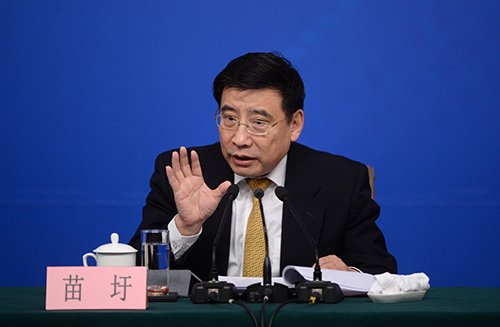工业和信息化部部长苗圩11日表示,《中国制造2025》及其相关政策措施对内资企业和外资企业一视同仁,制定相关政策不是说要限制外资企业。在十二届全国人大五次会议记者会上,苗圩对近日中国欧盟商会发布的《中国制造2025:产业政策对弈市场力量》研究报告进行了回应,他表示该报告一些观点存在对《中国制造2025》的误读。

The Made in China 2025 initiative brings equal opportunities to foreign and domestic enterprises and will strengthen the role of the market, the country's top industry regulator said in response to a suggestion by the European Union Chamber of Commerce in China that the initiative creates uneven playing field.
就近日中国欧盟商会称《中国制造2025》政策导致不公平竞争环境的观点,工信部有关领导回应称,《中国制造2025》对内资企业和外资企业一视同仁,并且会加强市场的作用。
The initiative, which was designed to promote high-end manufacturing in China, adheres to government-led, market-oriented principles, said Miao Wei, minister of Industry and Information Technology.
工信部部长苗圩表示,《中国制造2025》的目的就是推进国内的高端制造业,自推出以来一直坚持市场主导、政府引导的原则。
"Foreign and Chinese enterprises will continue to be treated equally. We have never forced foreign companies to transfer technology," Miao said at a news conference on the sidelines of the annual plenary session of the National People's Congress.
苗圩在在十二届全国人大五次会议记者会上说:“内资企业和外资企业都是一视同仁的。我们从来没有强制外资企业把技术转让到中国来。”
The remarks followed a report by the EU business group saying the push to upgrade industry will give Chinese companies an unfair advantage.
上述言论是对中国欧盟商会此前有关推进产业升级会给中国的企业带来不公平的竞争优势之说做出的回应。
Miao rebutted the allegation, saying entry policies in sectors such as new energy vehicles are applicable to both foreign and domestic businesses, and China's intent is to prevent companies from cheating on government subsidies.
苗圩否认了这一说法,并表示,针对准入条件相关领域,以新能源汽车为例,这个条件对国内外企业同样适用,制定这个政策的初衷是防止有些企业利用政府补贴钻政策的空子。
The Made in China 2025 initiative, unveiled in 2015, came into existence partly because foreign countries ban export to China of certain technologies and products.
2015年发布的《中国制造2025》一部分原因是一些国家禁止向中国出口特定的技术和产品。
Xiang Ligang, a telecom expert and CEO of the telecom industry website cctime.com, said, "China's market is so huge that foreign companies can all find a place. The initiative is unleashing big potential that everyone can tap into."
通信专家、飞象网总裁向立刚表示:“中国的市场很大,外国企业都能找到自己的位置。《中国制造2025》释放的巨大潜力,每个人都能利用。”
When it comes to the shrinking market share of foreign companies in the telecom sector, Xiang said, it is because domestic companies are making steady progress and even outshining their foreign rivals in technology and services.
对于外国企业在通信领域不断萎缩的市场份额,向立刚表示,这是因为国内公司不断稳步前进,甚至能在技术和服务领域超越外国同行。
"It has nothing to do with government support," he said.
他说:“这跟政府支持一点关系都没有。”
Miao also rejected the claim that the government has set market-share targets for domestic products.
苗圩同时也否认了有关政府为国内产品设定市场份额目标的言论。
"The targets are not in the government's plan but in a greenpaper issued by a panel of expert consultants. The panel made it clear from the beginning that such targets are of predictive nature, not mandatory," he said.
他说:“那些指标不是政府行为,而是在战略咨询专家委员会发布的绿皮书里提到的。他们已经声明,这个指标是预测性的,不是强制性的。”
Fu Liang, an independent analyst, said foreign companies should step up localization efforts to pounce on the opportunity brought by Made in China 2025 initiative.
独立分析人士付亮称,外国企业应该加快本地化进程,以抓住《中国制造2025》带来的机遇。
"The technology gap is narrowing. Foreign businesses should reconsider their core competency in China," he said.
他说:“技术鸿沟正在缩小。外国企业应该重新考虑他们在中国的核心竞争力。”
英文来源:China Daily
翻译&编辑:马文英
审校:丹妮
